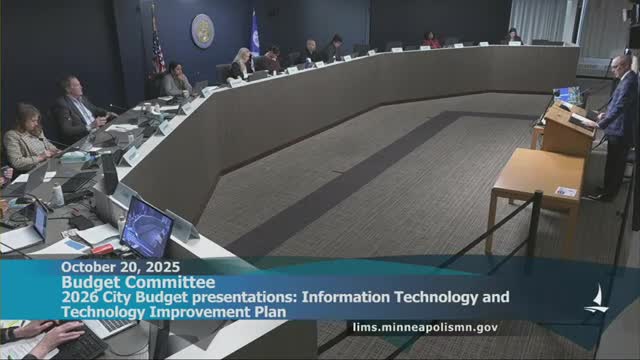City IT outlines $48.2M recommended budget, cyber risks and multi‑year TIP projects including ERP and 3‑1‑1 replacement
Get AI-powered insights, summaries, and transcripts
Subscribe
Summary
Paul Cameron, chief information officer, presented the IT department’s 2026 recommended budget (approximately $48.2 million) and a six‑year Technology Improvement Plan to the Minneapolis Budget Committee on Oct. 20, highlighting cybersecurity risks and major multi‑year projects.
Paul Cameron, chief information officer for the city of Minneapolis, presented the information technology department’s mayoral‑recommended 2026 budget and the six‑year Technology Improvement Plan to the Budget Committee on Oct. 20.
Cameron said the IT department’s recommended 2026 budget is approximately $48,200,000 and proposes 108 FTEs — unchanged from 2025 — with 11 current vacancies, nine of which are in active HR hiring steps. He described three program priorities: system health and security, workforce enablement and enterprise platform adoption. Cybersecurity and the rapid evolution of AI were listed as the top enterprise risks.
On performance measures, Cameron said roughly three‑quarters of the city’s 30 major systems are on current releases or have a plan, and that network availability targets (greater than 99.9%) are being met. He described recent accomplishments including retirement of a 20‑year document‑management system, resourcing of an on‑site tech hub for employees and donation of more than 900 devices to a community refurbishing program.
Cameron presented the Technology Improvement Plan (TIP) and three headline projects: a 3‑1‑1 CRM replacement ($2.0 million requested for 2026 and $2.5 million in 2027; $4.5 million total), an enterprise resource planning (ERP) modernization (branded Project Evolve, $3.5M in 2026, $7.6M in 2027 and $5.5M in 2028; $16.6M total), and the Tellme building‑blocks project (remaining implementation/licensing request of $71,000 in 2026). He also presented a previously adopted Loring Greenway systems rehabilitation request shifted into the permanent improvement levy with $1.5M requested in 2027.
Council members asked about ransomware and the city’s posture compared with Saint Paul; Cameron said there is no absolute guarantee against attacks but described layered defenses, a “zero‑trust” approach to compartmentalizing access, expanded identity and access management, increased security awareness training and a state partnership for real‑time threat monitoring. He also described plans to expand a public awareness campaign about social‑engineering scams that target residents.
Committee members asked for follow‑up detail on the department’s vacancies compared with prior years; Cameron said some positions had been held for the ERP program and others were in the interview or reposting stages and agreed to provide a vacancy comparison memo for the committee. The clerk was asked to file the IT and TIP presentations.
